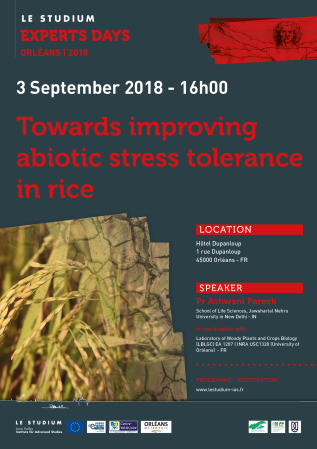Towards improving abiotic stress tolerance in rice
Hôtel Dupanloup
1 rue Dupanloup
45000 Orléans
France
Presentation
Growth, development and productivity of plants are adversely affected by environmental stresses such as drought, salinity, high and cold temperatures etc. Being sessile organisms, plants have developed excellent mechanisms of stress perception and signal transduction. Multiple, complex and dynamically intertwined interactions among different elements (DNA, RNA, proteins and metabolites) determine the phenotype and final response of plants towards environmental stresses. In response to these stresses, a multitude of processes are activated which enable the plants to cope with these stresses up to a certain extent. These include alteration of expression of stress responsive genes, production of stress proteins, alteration of ion transport, activation of the antioxidant machinery and accumulation of compatible solutes etc. Over the past few years, emergence of the novel “omics” technologies have greatly improved our understanding of abiotic stresses signalling. Genome-scale studies at transcript, protein and metabolite levels provide information about dynamic changes taking place at these functional levels. For full understanding of signalling networks, there is an increasing need for the integration of all these aspects. This approach is of remarkable relevance when the aim is to understand how plants respond to abiotic stresses. In order to understand molecular basis of stress tolerance as well as signalling network under unfavourable environmental situations, recent progresses on systematic use of “omics” technologies including genomics, transcriptomics, proteomics and metabolomics, have been summarized in this chapter. Furthermore, the integration of all these approaches which provide a systems biology method for understanding stress response in plants is also discussed. Ultimately, validation of the key genes using the tools of functional genomics would be required to achieve the target of raising crop plants for dry and saline lands.
Speaker
Pr Ashwani Pareek,
School of Life Sciences, Jawaharlal Nehru University - IN
in coordination with:
Laboratory of Woody Plants and Crops Biology (LBLGC) EA1207 | INRA USC1328 (University of Orléans) - FR








